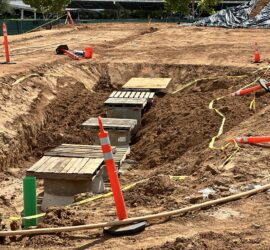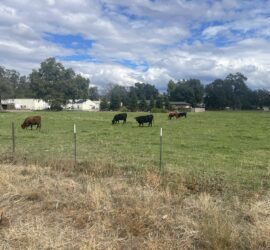Environmental Professional Definition
Environmental Professional: As per the EPA’s All Appropriate Inquiries Rule, an environmental professional is an environmental consultant that has an accredited education in earth or natural science, at least five years of formal training under another environmental professional, a professional state license, and maintains expert knowledge in the environmental geology, sustainability, and engineering fields. An environmental professional is typically a licensed professional geologist, entrusted by State and Federal government, that assists consumers with pollution prevention, contamination cleanup, regulatory compliance, and more. Updated January 16, 2024.

What is an Environmental Professional?
When conducting All Appropriate Inquiries (AAI), certification by an “Environmental Professional” is a requirement. This is to qualify under the Comprehensive Environmental Response, Compensation, and Liability Act (CERCLA) Innocent Landowner Defense. In fact, the ASTM Standard also requires due diligence performance by an “Environmental Professional.” Typically, the certification requirement applies to Phase I Environmental Site Assessments, in accordance with ASTM E1527-13.
According to CERCLA and AAI, an environmental professional must have sufficient education in certain applicable fields. For instance, geology and civil engineering. Additionally, the qualifier must have the training and work experience necessary to use professional judgment. This involves opinions and conclusions pertaining to environmental hazards. All findings and recommendations must be based on data analysis.
Qualifications of an Environmental Professional
To meet the definition of an “environmental professional” a worker must have all or one of the following:
- A state or tribal government-issued certificate or license, as well as a minimum of three years of full-time work experience in environmental engineering.
- A bachelor’s degree or higher in a science or engineering field, and a minimum of five years of relevant full-time work experience in environmental engineering.
- Ten years of relevant full-time work experience in environmental engineering.
Unqualified Professionals
Individuals who are not eligible qualifiers to be an “Environmental Professional,” may attempt to perform a Phase 1 Environmental Site Assessment for consumers. This may be unknown and unnoticeable to consumers, and will theoretically result in a disqualification of AAI and CERCLA innocent landowner liability defense. This would render the report useless to all institutions and agencies and could result in millions of dollars of liability under worst-case scenarios. Thus, all consumers are advised to research and review the resumes of the responsible professional performing each Phase 1 ESA, before contracting them.
Geotechnical Engineering IS NOT Environmental Engineering
It is very important for consumers to verify that the self-proclaiming environmental professional actually meets one (or all) of the qualifications in the section above. Furthermore, it is highly important to differentiate between those professionals with experience in “Geotechnical Engineering” versus “Environmental Engineering.” All consumers must understand that “Geotechnical Engineering” is NOT “Environmental Engineering,” and DOES NOT qualify as relevant environmental experience. Geologists and engineers with sole experience practicing geotechnical engineering, cannot pass themselves as environmental professionals.
What do Environmental Professionals Do?
A qualifying environmental professional has the legal authority to provide a variety of environmental consulting services. For instance, in the environmental due diligence sector, they perform indoor air quality tests, Phase 1 Environmental Site Assessments, Geophysical Surveys, Phase 2 Environmental Site Assessments, and contamination remediation. Moreover, these consultants can provide insight and advice about environmental sustainability, such as environmental compliance audits and corrections to environmental compliance violations.
Certifications
Relevant certification and license requirements include only the following: a current Professional Civil Engineer (P.E.) or Professional Geologist (P.G.) license, or another applicable license to conduct environmental assessments. Individuals qualifying with less than 5 to 10 years of experience must hold one of these to perform environmental site assessments or AAI to meet the definition in the rule.
Relevant Experience
“Relevant experience” means environmental engineering, or performing environmental site assessments. At a minimum, this experience includes environmental analyses, environmental investigations, remediation of subsurface contamination, and more. Additionally, other activities require an understanding of environmental laws. For example, distinguishing Recognizable Environmental Conditions, or Historical Recognizable Environmental Conditions versus Controllable Recognizable Environmental Conditions, or Environmental Issues. And the experience should involve using an acceptable environmental process. This is to understand where opinions using professional knowledge and decision-making skills to determine conditions may indicate hazardous substance releases.
Workers who do not meet any of the requirements to qualify as an “Environmental Professional” must work under the supervision of someone who does qualify.
Statement Certifying Conformance
In conducting AAI, an environmental professional must also include a statement certifying conformance. This includes the scope and limitations of AAI and ASTM E1527. Additionally, the individuals performing the assessment must legally declare they meet the definition.
Requiring strict qualifications for the individuals conducting due diligence assessments guarantees the quality of work. A professional who has the proper education and experience can identify nuances that a layperson cannot. For instance, pavement patches may not raise a concern for most but could reveal a history of gasoline stations. Environmental Professionals are also trained to identify other risk items. For example, scars from exploratory borings, monitoring wells, and former gasoline service station buildings.
Making Sure the Report Qualifies
When a property purchase is subject to the AAI, it is important to verify that the environmental consultant will supervise the AAI and Phase I ESA reporting meets the qualifications. A professional should:
- Meet the qualification requirements set forth by the AAI final rule (§312.10)
- Have direct experience performing Phase I Environmental Site Assessments as well as Phase II Environmental Site Assessments.
- This includes conducting all aspects of the AAI requirements, as well as conducting environmental sampling of soil, soil vapor, and water; interpreting hydro-geologic, geologic, and sampling data; and preparing complete site assessment reports.
- If a Phase II Environmental Site Assessment is a requirement, the environmental professional must meet the applicable state and local requirements for conducting environmental investigations. In most cases, a professional certification (such as a P.G.) is necessary.
- Be able to show experience and special knowledge within the specific industry being assessed. For example, mining and petroleum properties must be assessed by a special professional competent in that field.
- Be knowledgeable about local, tribal, state, and federal environmental laws. Especially regulations, associated compliance requirements and information on local agency records resources.
- The environmental professional should know the specific compliance and regulatory requirements for the industry in question.
- In addition, the environmental professional should have experience conducting research in the local area of the property so as to avoid any unintentional data gaps.
Knowledge is Power
A proper Environmental Professional will have knowledge that is obtained through years of observation and discovery. Geo Forward maintains a staff of experienced professionals meeting all AAI requirements. And, the Geo Forward team has an extensive understanding of regulatory compliance requirements. Moreover, the professionals at Geo Forward come from all industry backgrounds across the United States. Geo Forward’s staff environmental professionals provide accurate assessments, with fewer data gaps. As a result, the work reduces the risk and liability in commercial and industrial property transactions.
Additional Resources:
EPA Environmental Professional
United States EPA All Appropriate Inquiries Reporting Fact Sheet
US Environmental Protection Agency Environmental Professional Fact Sheet





